ENTER STAGE LEFT
Emory alumnus Kwofe Coleman plays a starring role at the helm of The Muny, one of the country’s most historic theater venues.
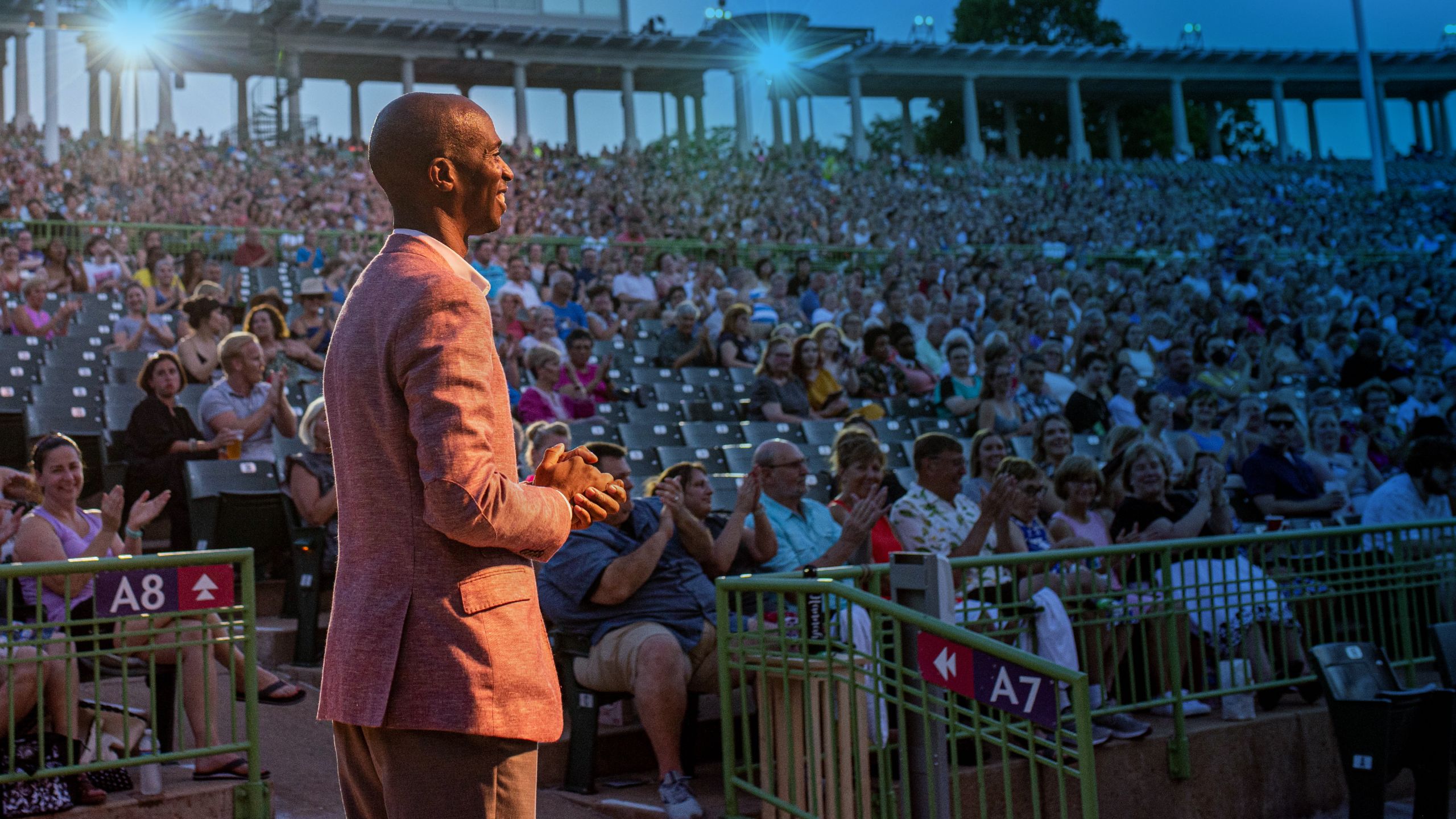
It’s a sultry summer night in St. Louis, Missouri. Thousands of theatergoers stream into The Muny, the largest and oldest outdoor musical theater in North America. Standing at stage left to greet audience members, as he does before and after every show of the nine-week season, is Kwofe Coleman 07C, the venue’s president and CEO. He knows every inch of this theater, which held its first production in 1919 and has since become not only a cherished local institution but a highly respected venue on the national theater scene.
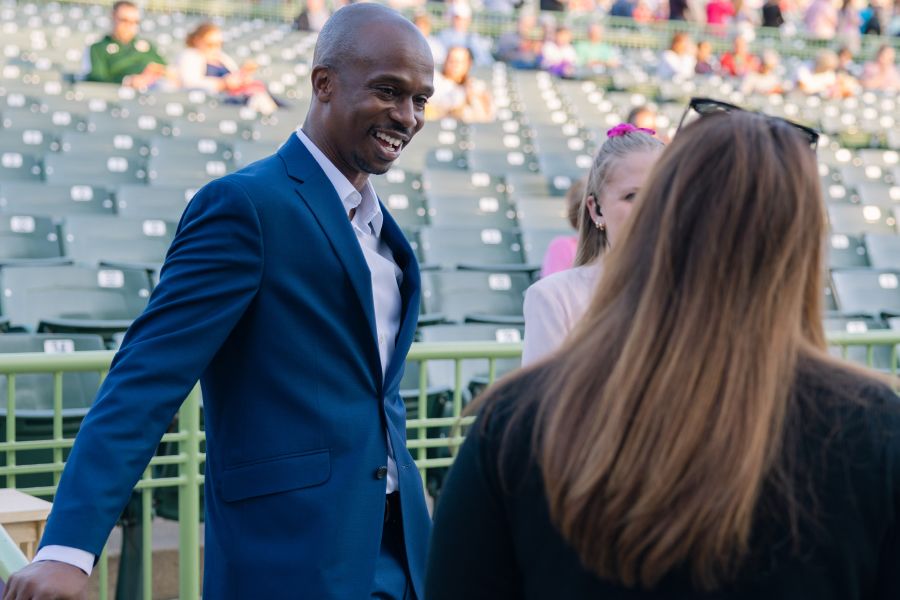
Kwofe Coleman rose to the top post of The Muny more than 20 years after he first worked at the venue as a teenager.
Kwofe Coleman rose to the top post of The Muny more than 20 years after he first worked at the venue as a teenager.
Coleman started working here at age 16 as an usher, pushing patrons’ wheelchairs up and down the steep aisles of the nearly 11,000-seat amphitheater in historic Forest Park. His ascension to become The Muny’s youngest leader and first Black president in 2022 at age 39 puts him at the forefront of a new generation of theater industry leaders. He’s among those striving to bring greater diversity to not only who and what appears on stage, but also who’s guiding these creative institutions from behind the scenes.

A PLACE THAT FEELS LIKE JOY

Coleman’s tenure at The Muny started in 1998 not so much by choice but by convenience: His older sister Aba already worked there as an usher. “That’s where the family car was going at night,” he says.
Ushering was physically taxing — “I was in the best shape I’ve ever been in my life,” he says — but his parents, who had immigrated from Ghana, had already instilled in him the virtue of hard work by their daily example. His mother, Eva, was a seamstress. His father, Nathaniel, was an architect who did all the repairs on their home and took side jobs to send Coleman and his older sisters, Aba and Nana, to private school.
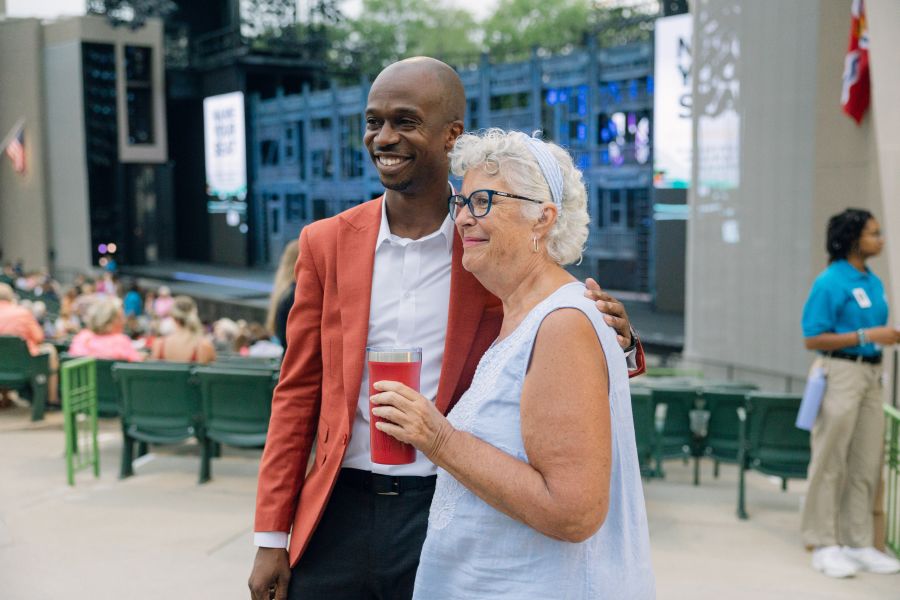
“My parents are the image of hard work, sacrifice and humility,” Coleman says. “They taught us about hard work but also that it was possible for us to achieve anything. They taught us to aspire, to be at the top of whatever you’re trying to do.”
Coleman thrived at The Muny. He loved the connections he made not just with other ushers his age but especially with the older patrons he assisted, whose families had been coming to the theater for generations. “When I came to The Muny, everyone was happy,” he says. “You were coming to a place that felt like joy.”

PERSONAL GROWTH AT EMORY
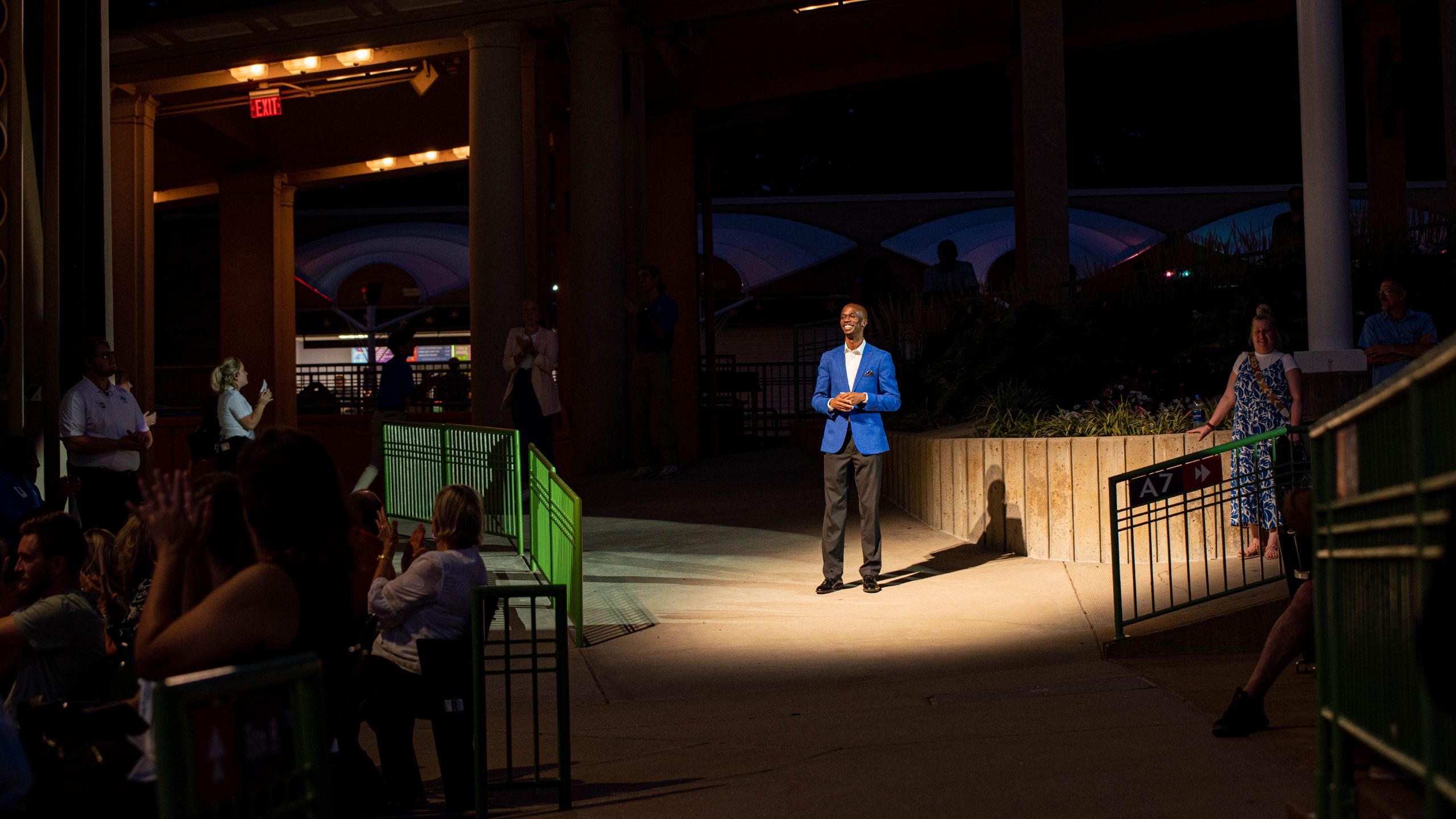
Coleman felt a similar connection upon visiting Emory for the Essence of Emory program, an invitation-only program for admitted students from underrepresented backgrounds who have demonstrated high academic achievement. “I loved everything about that experience,” he says. “I felt that joy and felt comfortable, like this could be my home for a while.”
Priscilla Echols, then associate dean of Emory College of Arts and Sciences, was a “guardian angel” throughout his transition to college as he navigated both academic and cultural challenges. While pursuing his English degree, he served as the student chair for Essence of Emory and president of the Black Student Alliance. “My parents did a tremendous job of teaching me how to be a young African man. But I also had to learn the balance between that and being a young Black man, which are two different things,” Coleman says. “Being in Atlanta, and the friends I connected with at Emory, taught me that.”
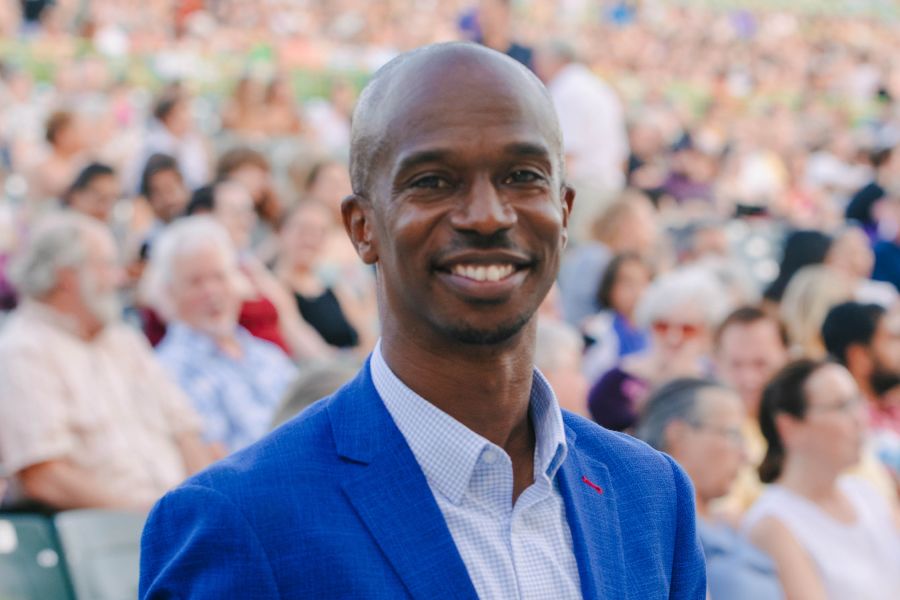
He returned to The Muny every summer and was promoted to captain of the ushers. Upon graduation from Emory, he contemplated a career in law. But a brief stint as a death-penalty investigator for the Southern Center for Human Rights left him dispirited and uncertain of his path.
When The Muny offered him a year-long internship in its accounting department in 2008, he leapt at the opportunity as a reset. “I realize how much happier of a person I was again,” he says, “And when you’re happy, you can perform at your best. I could see myself there.” He never left.

RISING THROUGH THE RANKS

Before he takes his post at stage left every night, Coleman surveys behind the scenes of the $33 million state-of-the-art stage, installed in 2019. “It’s hard to break my routine of checking on things. That’s the blessing and curse of having served as house manager for a couple of years,” he says. “I know it drives some people crazy, but I want to put my eyes on everything at least one time every night.”
As he rose through the ranks — from accounting to house manager, digital communications manager to director of marketing and communications — in the leadup to the theater’s centennial season of 2018, “Kwofe just killed every job that he had,” says Denny Reagan, who served as The Muny’s president and CEO for 30 years prior to Coleman. “He has this incredible intelligence and genuine care for people.”
Those attributes were on full display during The Muny’s $100 million Second Century Capital Campaign, in which Coleman connected with local philanthropists over their mutual love of The Muny and visions for its future.
“The Muny is a cherished institution for St. Louisans and there are few that endure 100 years,” says Dave Steward, founder and chair of World Wide Technology and a major benefactor of the theater. “Kwofe has the very tall task of putting the Muny on a solid footing for the new hundred. There’s tremendous opportunity to continue developing The MUNY as more than a theatrical venue. We know he is the right person to grow it as a community gathering place that increasingly brings us together as a diverse and inclusive community.”
With more than a century of shows to draw on, Coleman could anticipate most challenges as he became managing director, a de facto “president-in-training” role. Yes, it will rain on a few parades. A raccoon in the house? Animal control will corner the critter quickly so the show can resume. A patron with heart issues? An onsite EMS team handles medical emergencies.
But there was no anticipating the COVID-19 pandemic. From the start, Coleman anchored The Muny’s response on two principles: science-driven decisions, communicated clearly. As painful as it was to cancel the 2020 season and lose an anticipated $20 million in revenue, ensuring the safety of the audience and staff of 30-plus full-time and up to 800 seasonal employees was paramount.
The 2021 season started later, ran shorter (five shows instead of seven) and ended three days early due to a COVID-19 outbreak in the cast of “Chicago,” but those setbacks were far outweighed by the joy of bringing the community back together in the house. “That time solidified for me how to lead people in a way that instills confidence and provides peace of mind,” he says. “You have to be the barometer. You have to make hard choices and stick with them.”

THEATER FOR ALL

The mission statement of The Muny, which is a nonprofit, is to enrich lives by producing exceptional musical theater, accessible to all, continuing its remarkable tradition in Forest Park. As president, Coleman and his staff are emphasizing “accessible to all” by prioritizing choices that intentionally broaden and evolve The Muny’s identity and relationships, both through the art The Muny produces and its investment in the community.
That commitment is most evident on stage. Recent seasons have included The Muny debuts of “Kinky Boots,” “Rent” and “The Color Purple,” which feature characters of diverse racial and gender identities. “We needed all three of those to show the breadth of who we are going forward,” Coleman says. All three casts included Broadway vets drawn in by the stellar reputation of The Muny and of Mike Isaacson, The Muny’s artistic director and executive producer whose Broadway productions have won 33 Tony Awards.

The Muny is one of the largest and oldest outdoor theaters in the U.S.
The Muny is one of the largest and oldest outdoor theaters in the U.S.
In terms of performers, they have been casting a wider net and letting go of preconceived notions of what a character should look like. For example, nonbinary actor J. Harrison Ghee — who won a Tony Award this year — performed the role of Velma Kelly in The Muny's 2021 production of “Chicago.”
From stage left, “I get the exit poll right away,” Coleman says. “You get a lot of joy, but you also get the truth. I love to hear it in real time and let the audience know that the highest levels of this institution are accessible to them.”
Coleman is striving to make all levels of The Muny more accessible and representative, from expanding the contractor base to bringing the demographics of the audience and talent pipeline more in line with that of the St. Louis region as a whole. His first full-time hire, director of education Tali Allen, “has done a tremendous job of building programs that figure out where the need is and fill that need,” he says.
Audition workshops for third through eighth grade help level the playing field for talented performers who don’t attend the dance academies that are traditional pipelines for the Muny Kids and Muny Teens performing troupes. “These kids are our ambassadors,” he says. “When you look at that group now, it’s such a wonderful balance of representation in race, gender, background and where they go to school, and what they all have in common is that they’re great performers.”

Another program, Technical Theater Training, provides training and mentorship to local high students interested in the theater trades. Meanwhile, Muny U connects high school theater classes virtually with industry-leading musical-theater professionals from across the country to learn every step of the production process. Finally, a vastly expanded internship program gives college and graduate students hands-on experience in 22 different departments, including arts administration.
These efforts align with initiatives on the national theater scene to train and mentor a new generation of more diverse industry leaders. For example, the Theater Leadership Project aims to provide a three-year fellowship with job placement and long-term support for Black creatives in key leadership positions. Coleman himself is the current president of the National Alliance for Musical Theatre, which has pledged to address and improve racial equality in hiring practices, training, leadership and other issues among its 170 member organizations.
“Leading major art institutions has not necessarily been something that people of color have had the opportunity to do,” he continues. “I want to be part of changing that reality. Because when you carry that identity, you also carry the responsibility for leaving a clear path behind you and next to you.”
For there’s always room for more to enter the stage.
Story by Kristin Baird Rattini. Photos courtesy of The Muny. Design by Elizabeth Hautau Karp.


Want to know more?
Please visit Emory Magazine, Emory News Center, and Emory University.

